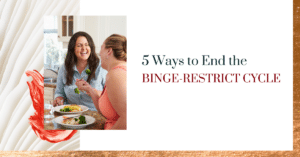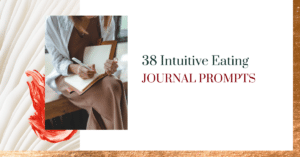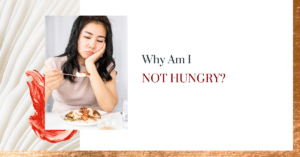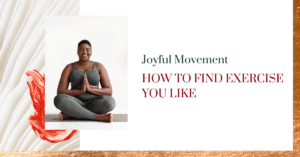Why Am I Not Hungry?
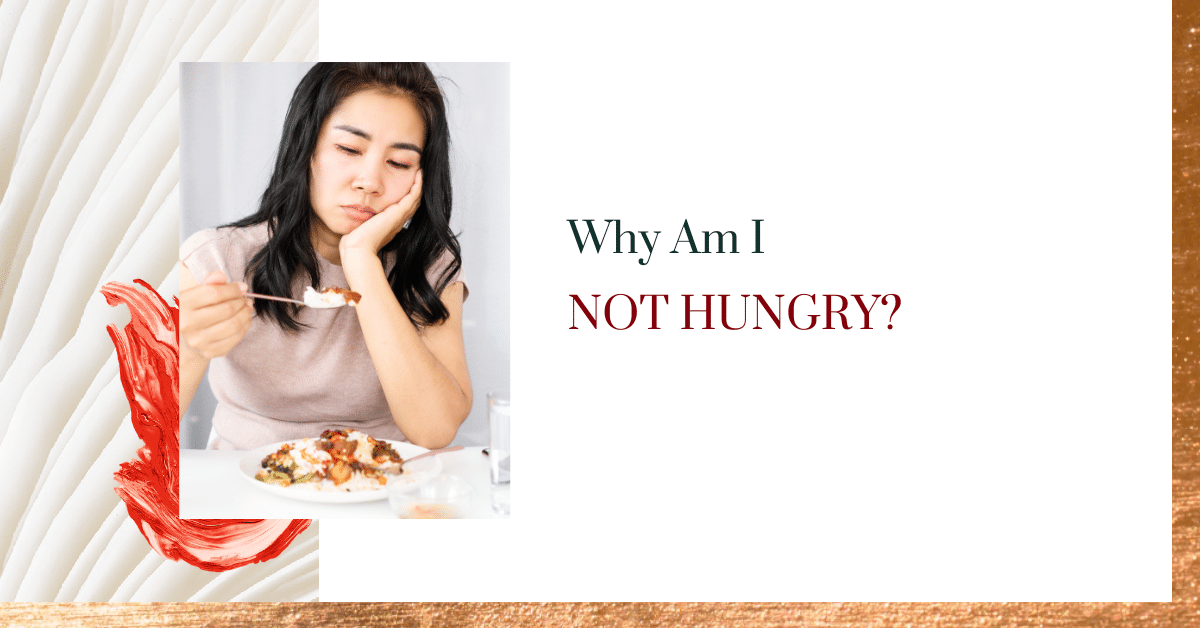
You have started on your intuitive eating journey, but lately, you have been feeling stuck. You know you are supposed to be listening for signals from your body to let you know it’s time to eat, but the only thing you hear is a voice in your head asking, “why am I not hungry?” Read on to find out why you might not feel hunger cues, and what you can do about it.
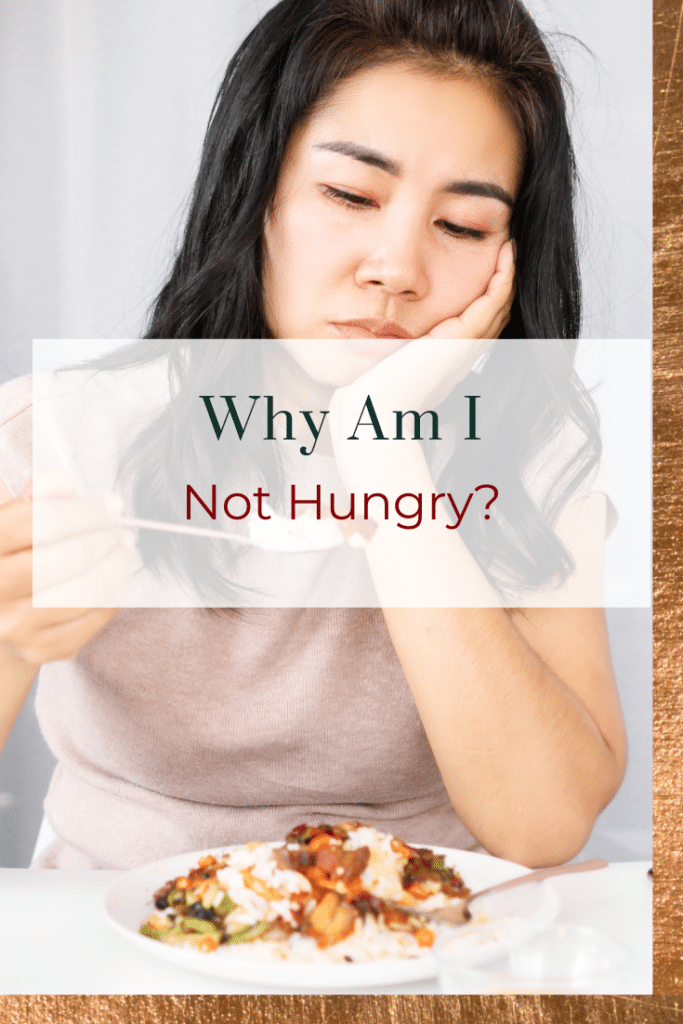
Why Don’t I Feel Hungry?
There are a variety of potential answers to this confusing question. In a previous post I talked about how the following things that can impact appetite and reduce your drive to eat:
-Certain physical and mental health conditions can affect your appetite
-New medications or changes to your medications can have an impact on your appetite
-If you’ve been working on intuitive eating, food may not have as much power over you which means you crave foods less than before, and food feels less exciting. This can sometimes make it harder to eat.
Today, I will focus on another big reason why you may not feel hunger cues: diet culture disconnects us from our body cues.
One of the principles of intuitive eating is to honor your hunger. This can feel pretty complicated because, in order to honor your hunger you must first know what hunger is and feels like for you.
Many people with a history of dieting struggle with this because they report not feeling hungry. Why is that? If we take a step back and reflect on some of the common tenets of diet culture, they can include:
- External food rules and guidelines
- Moralizing food choices i.e. good/bad, clean/toxic
- Ignoring hunger and fullness cues (and eating according to portion sizes or calories or macro numbers)
- Emotional eating stigma
- Focus on appearance and body size
- Body dissatisfaction
- The repetitive failure and shame cycle
…it can begin to make sense how easily we can disconnect from, unlearn, and “mute” our hunger cues.
Because all of these “diet rules” and patterns train us to stop listening to our own bodies and our own wants and needs. They teach us that we do not know what is best for us, and that we can’t trust our body signals.
This lack of trust leads to disconnection: if we believe we cannot trust the signals we get, we tune them out. And the more we tune them out, or ignore them, the weaker these hunger signals get.
Let’s take a deeper look at how each of these areas can impact your connection to your body cues.
External Rules and Guidelines:
Diet culture promotes rigid external rules about what, when, and how much to eat. Often you’re encouraged to rely on meal plans, calorie counting, or strict portion control. This external control leads to a disregard for your preferences, your desires, your experiences that created connections to certain foods, and your cultural foods. Over time, this leads to a repetitive overriding of your internal cues and diminishes your ability to listen to your body cues.
Moralizing Food Choices:
When foods are categorized as “good” or “bad,” we attach a moral value to eating behaviors. This dichotomous or binary thinking can lead to guilt, shame, and anxiety around food choices, making it challenging in another way to trust your own desires and preferences. The focus shifts from internal cues to external judgments based on societal standards.
Ignoring Hunger and Fullness Cues:
Following a diet or dieting rules promotes the exact opposite of honoring your hunger. You are explicitly directed to ignore or suppress feelings of hunger or fullness. You are encouraged to follow predetermined meal times and/or portion sizes, irrespective of your body’s signals. This suppression of natural hunger and fullness cues can lead to disordered eating patterns, such as chronic under-eating or overeating at certain times all the while never really knowing if you are hungry or full.
Emotional Eating Stigma:
Diet culture stigmatizes emotional eating, portraying it as a weakness or a lack of control, again making us feel bad about ourselves. As a result, we may feel guilty or ashamed for turning to food as a source of comfort or coping with emotions, which further alienates us from our bodies’ genuine needs and emotional cues.
Focus on External Appearance:
In our culture, there is a strong emphasis placed on achieving a specific body size or appearance, and thinness is equated with health, respect, and worthiness. This fixation on external aesthetics takes precedence over internal well-being and fosters the disconnection from the body’s inherent wisdom and unique needs.
Body Dissatisfaction and Body Comparison:
Diet culture perpetuates the notion that our bodies are inherently flawed and need modification. This constant messaging and normalization of dissatisfaction with one’s body is yet another influence that disconnects us from our body’s signals instead of honoring internal cues.
Failure and Shame Cycle:
Diet culture thrives on the cycle of dieting, weight loss, and inevitable weight regain. This cycle leads to feelings of failure, self-blame, and shame, which further intensify the disconnection from the body because it erodes self-trust. The focus shifts away from internal cues to external metrics of success and failure and worth.
How to Know if You Are Hungry
Phew, time for some deep breaths. Can you see how many factors are at work telling us to disconnect from ourselves and our body cues? It’s no wonder you may not feel hunger cues regularly throughout the day!
The good news is that our bodies are incredibly wise and you possess the ability to get back in connection with your body cues, and to be able to understand what your body is communicating.
Tools To Help You Get Back In Touch With Hunger Cues:
1. Create a loose, flexible eating schedule. Eating on a regular basis during the day can help your hunger cues to return. The more regularly and consistently you eat during the day, the more body trust and connection are rebuilt – the more your hunger and appetite cues will return. Most people feel best when they eat every 3-5 hours. Even if you don’t feel physical hunger, doing some mechanical eating is important. Make it flexible, for example:
- Breakfast between 7:30-9:00 am
- Snack around 11:00 am
- Lunch between 1:00-2:00 pm
- Snack around 3:00-4:00 pm
- Dinner around 7:00-8:00 pm
2. Find meals and snacks that you’re able to eat, even if you don’t feel hungry. This is where convenience foods can be really helpful, especially if you’re struggling to make food. Here are some more ideas on what to do if no food sounds good.
3. Try using the Hunger-Fullness scale. Once you’re eating consistently, the hunger-fullness scale can be a helpful tool to better understand the subtle signals your body sends when it is hungry (and/or full and satisfied).
And don’t forget: there are different types of hunger and many other reasons besides physical hunger to eat.
Looking for more support?
My team and I offer virtual one-on-one nutrition coaching, supporting people with intuitive eating, disordered eating and eating disorders, and more.
I also recommend my Unapologetic Eating 101 Course, an online, self-paced intuitive eating and body image program to help you liberate yourself from dieting and make peace with food and your body.
Author Bio
This blog post was written by Nicci Schock, a dietetic intern at Teachers College, Columbia University.
The post was reviewed and edited by Alissa Rumsey, MS, RD, CSCS, a registered dietitian and Certified Intuitive Eating Counselor. She specializes in weight-inclusive care, intuitive eating, body image healing, mindfulness, self-compassion, and healing from chronic dieting, disordered eating, and eating disorders. Alissa holds a Bachelor’s Degree in Nutrition and Exercise Science, and a Master’s Degree in Health Communications, and is also an NSCA Certified Strength and Conditioning Specialist.
share the love

about
Alissa Rumsey, RD.
Alissa Rumsey, MS, RD, CDN, CSCS (pronouns she/her/hers) is a registered
dietitian, nutrition therapist, certified intuitive eating counselor, and the author of
Unapologetic Eating: Make Peace With Food and Transform Your Life. Alissa is
passionate about helping people reclaim the space to eat and live,
unapologetically.

A twice-a-month round-up of inspirational stories, lessons, practical tips and encouragement for living your most authentic, unapologetic life.
The Unapologetic Life
RECENT POSTS

The Unapologetic Life
A twice-a-month round-up of inspirational stories, lessons, practical tips and encouragement for living your most authentic, unapologetic life.






